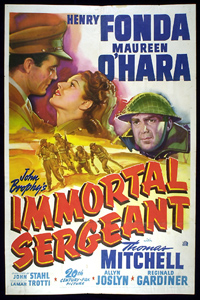| Immortal Sergeant | |
|---|---|
 | |
| Directed by | John M. Stahl |
| Written by | Lamar Trotti |
| Based on | Immortal Sergeant 1942 novel by John Brophy |
| Produced by | Lamar Trotti |
| Starring | Henry Fonda Maureen O'Hara Thomas Mitchell |
| Cinematography | Arthur Miller |
| Edited by | James B. Clark |
| Music by | David Buttolph |
| Color process | Black and white |
| Production company | 20th Century Fox |
| Distributed by | 20th Century Fox |
| Release date |
|
| Running time | 91 minutes |
| Country | United States |
| Language | English |
| Box office | $2.2 million (US rentals) |
Immortal Sergeant is a 1943 American war film directed by John M. Stahl for 20th Century Fox. Set in the North African desert during World War II, it stars Henry Fonda as a corporal lacking in confidence in both love and war, Maureen O'Hara as his girlfriend, and Thomas Mitchell as the title character. The film was based on the 1942 novel of the same name by John Brophy.
Plot
In North Africa, experienced Sergeant Kelly leads a British patrol, accompanied by Corporal Colin Spence, an unassertive Canadian. When they are attacked by Italian airplanes, they manage to shoot one down, but it crashes on one of their vehicles, killing eight men. Later, Kelly leads the six survivors on an attack of an Italian armored car but is seriously wounded. He orders Spence to leave him behind; when Spence refuses to obey, he shoots himself.
Spence leads the remaining three men toward an oasis. Before they can reach it, though, a transport plane lands and disgorges German soldiers who set up a base. After sneaking in to steal badly needed food and water, Spence has to assert his leadership when one of his men advocates surrendering. Instead, Spence leads them in a surprise attack under the cover of a sandstorm. The British emerge victorious, though one man is killed and Spence is wounded.
The corporal comes to in a Cairo hospital and finds he is to be given a medal and promoted to lieutenant. His newfound assertiveness extends to his personal life. He proposes to his girlfriend Valentine, who he had thought of (in flashbacks) throughout his ordeal.
Cast
- Henry Fonda as Cpl. Colin Spence
- Maureen O'Hara as Valentine Lee
- Thomas Mitchell as Sgt. Kelly
- Allyn Joslyn as Cassity
- Reginald Gardiner as Tom Benedict
- Melville Cooper as Pilcher
- Bramwell Fletcher as Symes
- Morton Lowry as Cottrell
Reception
Theodore Strauss of The New York Times called the film "disappointing", writing that while it was "occasionally a warm and human study of a man's triumph over his own fears," the romance was "vapid" and O'Hara's character was "very dull". Variety called the film "a compact drama, interestingly told." Harrison's Reports wrote, "Although it does not reach great dramatic heights, and it is somewhat long drawn out, the production and the performances are so good that one's interest is held consistently." David Lardner of The New Yorker wrote that the desert peril scenes were the "most solid aspects of the picture and, since they are fairly well handled, succeed in putting it on its feet." Lardner was distracted, however, by "the strange difficulty O'Hara seems to have in pronouncing polysyllabic words."
References
- "Immortal Sergeant". American Film Institute. Retrieved February 20, 2016.
- "Top Grossers of the Season", Variety, 5 January 1944 p 54
- Turim, Maureen (17 December 2013). Flashbacks in Film: Memory & History. Routledge. p. 128. ISBN 978-1-317-91667-3.
- Strauss, Theodore (February 4, 1943). "Movie Review - The Immortal Sergeant". The New York Times. Retrieved February 20, 2016.
- "Film Reviews". Variety. New York: Variety, Inc.: 8 January 13, 1943.
- "'The Immortal Sergeant' with Henry Fonda, Thomas Mitchell and Maureen O'Hara". Harrison's Reports: 7. January 9, 1943.
- Lardner, David (February 6, 1943). "The Current Cinema". The New Yorker. New York: F-R Publishing Corp. p. 52.
External links
- Immortal Sergeant at IMDb
- Immortal Sergeant at the AFI Catalog of Feature Films
- Immortal Sergeant at the TCM Movie Database
| Films directed by John M. Stahl | |
|---|---|
|
- 1943 films
- 1943 romantic drama films
- 1940s war films
- 20th Century Fox films
- American romantic drama films
- American black-and-white films
- Films based on British novels
- Films based on military novels
- Films directed by John M. Stahl
- Films scored by David Buttolph
- North African campaign films
- World War II films made in wartime
- American war drama films
- Films set in London
- 1940s English-language films
- English-language romantic drama films
- English-language war films